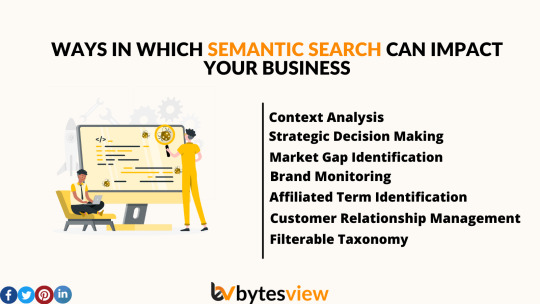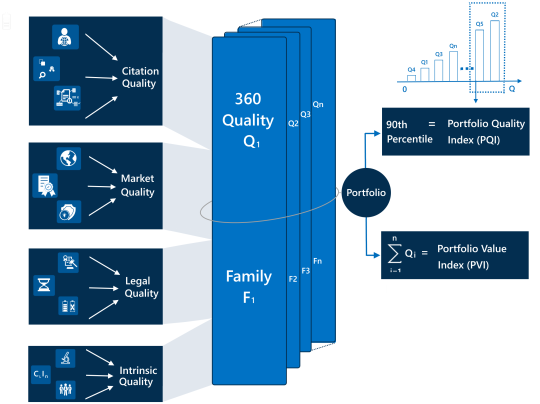#semanticsearch
Explore tagged Tumblr posts
Text
How Semantic Search Enhances SEO Results

Ever wondered how search engines appear to know what it is you want to find even if your search terms are not particularly specific? The power behind this is semantic search. Semantic search is superior to keyword matching since it takes into consideration the connotations of your inquiries. For instance a search query such as ‘best pizza near me’ when done at midnight will not require the list of pizzerias in the neighborhood but those that are open at such a late hour and deliver. How does semantic search work? 1. Natural Language Processing (NLP): It allows search queries to be understood in a similar way to a human understanding hence, provides more relevant results. 2 . Knowledge Graph: Mak – Establishes relationships between facts concerning different types of entities and enables the identification of related results. 3. RankBrain: Algorithm that refines the results of a set for analysis to match the user’s intent and the set’s history. Now you may think that how it influences the SEO? To adapt to semantic search: 1. Conversational tone and language is the fashion to adopt when doing voice searching. 2. Prioritize technical SEO and make your site is fast, mobile-friendly and is designed to meet users needs. 3. Make content plans based on the user intention and the subjects that are connected with the topic. Semantic search is revolutionising SEO in a way by factors such as the intention and environment of the user. This approach ensures that the indexed content is always useful and simple in a bid to defend and/or acquire positions in search engines.
Read more: Semantic Search Enhance SEO Results
#SEO#SemanticSearch#DigitalMarketing#ContentStrategy#VoiceSearch#NaturalLanguageProcessing#TechTrends
0 notes
Text
🚀 Dive into the Future of SEO with Semantic Search! 🔍
Curious about how semantic search technologies are reshaping the SEO landscape? 🌐 Discover how search engines are now understanding context and user intent, and learn actionable strategies to optimize your content for these advanced algorithms.
💡 Key takeaways:
Focus on high-quality, relevant content
Leverage structured data for better visibility
Understand and target user intent
Incorporate LSI keywords for thematic relevance
Join the discussion and stay ahead in the digital game! 📈 👉
0 notes
Text
Problem: Are you overwhelmed with the large number of records in your search results, making it difficult to focus on specific subsets of information? Solution: The Search Within Records filter offers a powerful solution to streamline your search process.
#innovation#patseer#patentanalytics#patentsearch#patentlandscape#semanticsearch#patentportfolio#patentclassification#patents
0 notes
Video
youtube
AI Changes Librarian Science Search
Discovering scientific information involves not only searching for keywords in databases but also considering the relevance, presentation, and accessibility of the content.
The digital age has brought new technologies and challenges that affect how we discover information, making information literacy essential for managing the increasing volume of publications.
Various search methods, such as keyword and natural language searching, APIs, and linked data interfaces, are used to retrieve information from multiple sources. Browsing, skimming, and scanning are quick ways to find relevant information, and semantic search engines can improve retrieval performance.
As a librarian, staying informed about new search engines and technologies is essential, considering appropriate resources for finding scientific literature and understanding the different search options and ways to refine results.
Text mining, visualization, and linked data can help manage and discover information, while citation linking and cited reference searching have become powerful tools for finding scientific information.
Serendipitous connections and accidental information discovery can lead to critical new themes in research while sharing research data and depositing it in publicly accessible databases can increase discoverability.
New technologies based on AI are transforming the way scientists do research, communicate findings, and discover scientific information. At the same time, social networks enable researchers to connect, collaborate, and stay up-to-date with the latest research in their field.
#youtube#ScientificInformationDiscovery InformationLiteracy DigitalAgeChallenges SearchMethods BrowsingSkimmingScanning SemanticSearch LibrarianInsig
0 notes
Text

Boost Your Site’s Power with #SemanticSEO 🚀
Google’s #SemanticSearch is all about connecting topics, entities, and search intent. 🌐💪 Make your content meaningful and organized to stay ahead! Focus on relevance over keywords to level up your SEO game!
#DigitalMarketing#SEO#semantic seo#seotips#search engine optimization#search engine ranking#google search#search engine optimisation services
1 note
·
View note
Photo

FAQ Schema is a structured data markup that helps search engines understand the content of a webpage and display relevant information to users in search results. Here are some of the benefits of implementing FAQ schema for SEO and UX: 1. Increased visibility in search results: Implementing FAQ schema can help your website appear in rich snippets on search engine results pages, which can increase your website's visibility and click-through rate. 2. Improved user experience: FAQ schema can help users find answers to their questions quickly and easily, which can improve their overall experience on your website. 3. Higher search engine rankings: Providing relevant and helpful information to users can help improve your website's search engine rankings, as search engines prioritize websites that offer valuable content. 4. Better click-through rates: Including FAQ schema on your website can help attract more clicks from users who are looking for answers to their questions, as they can quickly see that your website offers the information they need. 5. Increased website traffic: By providing valuable information to users, your website can attract more traffic and potentially lead to more conversions and sales. 6. Improved brand reputation: Offering helpful information to users can help improve your brand's reputation and establish your website as a trustworthy source of information in your industry. Like it, Save, Share It.... . . . #theseocircle #netnavigators #FAQschema #SEObenefits #UXimprovement #SearchVisibility #RichSnippets #SERPfeatures #OrganicTraffic #ContentOptimization #UserExperience #UserEngagement #SearchRankings #WebsiteVisibility #ClickThroughRate #ConversionRate #DigitalMarketing #BrandAwareness #TrustworthySource #Expertise #Authority #KnowledgeSharing #OnlinePresence #UserIntent #SemanticSearch #StructuredData #DataMarkup https://www.instagram.com/p/CpiUoX4v6pz/?igshid=NGJjMDIxMWI=
#theseocircle#netnavigators#faqschema#seobenefits#uximprovement#searchvisibility#richsnippets#serpfeatures#organictraffic#contentoptimization#userexperience#userengagement#searchrankings#websitevisibility#clickthroughrate#conversionrate#digitalmarketing#brandawareness#trustworthysource#expertise#authority#knowledgesharing#onlinepresence#userintent#semanticsearch#structureddata#datamarkup
0 notes
Text
Semantic Search Using Natural Language Processing – Tutors India
Semantic search may provide further business benefits by merging NLP with an intuitive user interface and making it straightforward for anyone to interact with and get the results they’re looking for.
For More Info (Source):
#semanticsearchengine#semanticsearch#naturallanguageprocessing#nlppython#naturallanguage#processinginai#nlpmodels#machinelearning#dissertationhelp#dissertationwritinghelp
0 notes
Photo

Check out ways in which semantic search can help you make sophisticated text analyses for all types of industries across the globe.
visit: https://www.bytesview.com/semantic-similarity
0 notes
Photo

Patent family quality metrics in PatSeer.
#patseer#patentdata#innovation#patentsearch#patentportfolio#intellectualproperty#competitiveintelligence#semanticsearch
1 note
·
View note
Link

Semantic search helps enhance the user-experience of a search engine. Read on to know more about semantic search and how it impacts SEO. With semantic search, the internet now delivers straightforward answers which are directly linked to the question in the search query.
0 notes
Link
One of the major benefits of semantic SEO is that semantic SEO makes the data more discoverable for both the user and search engines.
Reap the benefits of semantic seo with the best seo company in india, serving clients worlwide with more than 95% retention
0 notes
Link
Get the power to match candidates with job openings to find the best fit. The matching technology helps in choosing the right candidate through synonym matches related to skills/ competency, domain, location, tools, education, and job title.
0 notes
Text
Boost Your Site’s Power with #SemanticSEO 🚀
Google’s #SemanticSearch is all about connecting topics, entities, and search intent. 🌐💪 Make your content meaningful and organized to stay ahead! Focus on relevance over keywords to level up your SEO game!
#DigitalMarketing#SEO#semantic seo#seotips#search engine optimization#search engine ranking#google search#search engine optimisation services
1 note
·
View note
Text
Everything You Need To Know About Semantic Search
Semantic search is redefining search and how! Today, enterprise search tools are all based on semantic search. It aims to achieve higher relevancy and accuracy. This article takes a closer look into how it has changed our approach to search.
Traditional Search
Search has come a long way with the introduction of advanced technologies. What we expect from it has also evolved with time. Now, one might wonder what was wrong with the traditional search approach, which was primarily based on keywords. Well, the simple answer is the lack of accuracy, as the keyword-based approach can often go wrong. This lack of consistency can serve the purpose of the average user. However, enterprises depend on the accuracy of the search to gather valuable insights into their business. As a result, there is a need for a more advanced search tool.
Semantic Search
What makes enterprise search more complex is the fact that it deals primarily unstructured and unorganized data. Gathered from multiple sources, the data is present in various formats, including social media, emails, images, documents. While all this data contains key insights that can be used to make important business decisions, it only adds to the complexity of the search process. This is where semantic search, which is based on principles of artificial intelligence (AI), can step in. It is the solution to the challenges of the traditional keyword-based approach.
How Semantic Search is Different
Now, in order to get a clear idea of how AI based semantics can transform the search approach, we must look into how it works. Here’s the basic difference: Keyword Search Keyword-based search works by matching the query term with its density on a page. In other words, when a user types in a query, the platform starts looking for pages, documents and other sources for the presence of the term. The ones that have the query phrase in them are displayed in the results. While this often serves the purpose, its biggest shortcoming is the fact that it cannot display results with similar terms. This is because these terms do not contain the keyword but are very similar in meaning and essence. Semantic Search and Machine Learning However, semantic search is all about deciphering the meaning of the query term and then displaying results. These results are not just relevant and but also cater to a broad range of its synonyms. Thus, semantic technology significantly improves the scope of search and brings up results that are never displayed in totality by the traditional approach. Note that synonym search is something that can be achieved with pure machine learning technologies. But it is an exhaustive process that is time-consuming and requires a lot of effort in training machines to learn a set of synonyms. Moreover, pure machine learning has limited use in the absence of artificial intelligence. Artificial Intelligence Semantic technology that is based on AI is equipped with the capability of understanding the human language. It can also decipher the context of the query. Thus, semantic tools get the power to understand the meaning of the query term and its context, to show up the most relevant results, irrespective of its presence or absence.
The Key Advantages
Now that we are clear about how it works and the possibilities it offers, let us sign off by looking at few of its advantages. These have the potential to help your business gain a competitive edge. Ability to extract relevant information from diverse sources, helping you broaden the scope of search results, without compromising on the relevancy. Offers faceted search, which allows you to refine your results using one or multiple parameters. Helps you establish relationships between different content, based on relevance and meaning. Makes you get a better understanding the key concepts and trends that are important to your business. The search process is faster, thus paving the way for quick insights. Draw accurate conclusions and use them to formulate strategies for your business.
Conclusion
Semantic search is redefining our approach to search. It has the ability to provide us with relevant and deep insights. Today, enterprises are awakening to the importance of investing in a semantic search platform for their business. Read the full article
0 notes
Text

Semantic Search Using Natural Language Processing – Tutors India
Semantic search may provide further business benefits by merging NLP with an intuitive user interface and making it straightforward for anyone to interact with and get the results they’re looking for.
For Enquiry Contact Us:
Website: https://www.tutorsindia.com/
Mail: [email protected]
(UK): +44-1143520021
IND: +91-8754446690
Whatsapp: +91-8754446690
Linktree: https://linktr.ee/tutorsindia
#semanticsearchengine#semanticsearch#naturallanguageprocessing#nlppython#naturallanguage#processinginai#nlpmodels#machinelearning#dissertationhelp#dissertationwritinghelp
0 notes
Text
SEO Expert Upasna Gautam discusses Semantic Search
0 notes